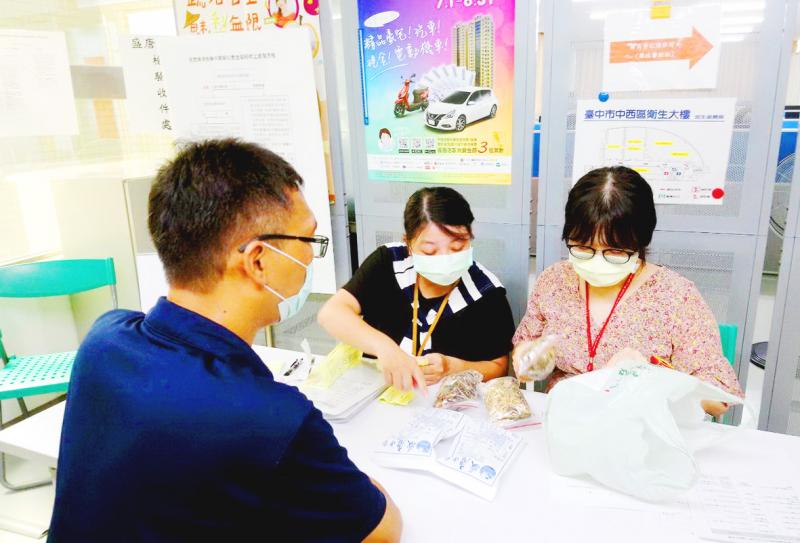A task force has been established to help people who got lead poisoning after ingesting products from Sheng Tang Chinese Medicine Clinic (盛唐中醫) and Jiu Fu Chinese Medicine Clinic (九福中醫), the Taichung Legal Affairs Bureau said yesterday.
As of Wednesday, 195 people who had been to the Taichung-based clinics had undergone health checks elsewhere, with 21 diagnosed with lead poisoning, the Taichung Health Bureau said.
The clinics on Friday last week were ordered to shut down following allegations that they had provided products containing cinnabar and lead tetroxide, which were banned in Taiwan in 2005.

Photo courtesy of Taichung City Government Health Bureau
Authorities have received 280 samples of products from the clinics, 164 provided by the clinics at the request of the health bureau and 116 from people who got products from the clinics, the health bureau said, adding that it would continue its investigation and monitor developments.
Taichung Legal Affairs Bureau Director Lee Shan-chih (李善植) said that the 21 people involved in the case exceeds the threshold of 20 required to start a class-action lawsuit.
The legal bureau is to work with the Consumers’ Foundation to help the people affected to seek compensation from Sheng Tang and Jiu Fu, as well as Shin Long Medicine Co (欣隆藥業), which supplied the clinics, Lee said.
It has established a dedicated window, where people can submit receipts and laboratory results from tests done on products they obtained from the clinics, as well as medical documents showing abnormal levels of lead in their blood and medical bills, all of which can help in a class-action lawsuit, he said.
There are nine hospitals in Taichung that can test blood for heavy metals and treat people with the condition, the health bureau said, adding that there are ample medical supplies to treat lead poisoning.
People who have used products from Sheng Tang and Jiu Fu can bring unused portions or packaging to the Taichung Office of Food and Drug Safety to find out whether they contained illegal substances, the health bureau said.
Separately, the National Union of Chinese Medical Doctors’ Association on Wednesday said that it would pay 50 percent of costs for tests to detect heavy metals in blood that people seek through the Consumers’ Foundation.
Visits to traditional Chinese medicine clinics have dropped by 20 percent since these reports emerged, association Director-General Ko Fu-yang (柯富揚) said in a statement.
It is understandable that people are concerned, but doctors, too, are concerned about people suddenly halting their medication, especially for chronic diseases, Ko said, adding that his association is offering the subsidies in the hope that people would feel at ease and resume taking their medication.
Additional reporting by Lo Chi

A group of Taiwanese-American and Tibetan-American students at Harvard University on Saturday disrupted Chinese Ambassador to the US Xie Feng’s (謝鋒) speech at the school, accusing him of being responsible for numerous human rights violations. Four students — two Taiwanese Americans and two from Tibet — held up banners inside a conference hall where Xie was delivering a speech at the opening ceremony of the Harvard Kennedy School China Conference 2024. In a video clip provided by the Coalition of Students Resisting the CCP (Chinese Communist Party), Taiwanese-American Cosette Wu (吳亭樺) and Tibetan-American Tsering Yangchen are seen holding banners that together read:

UNAWARE: Many people sit for long hours every day and eat unhealthy foods, putting them at greater risk of developing one of the ‘three highs,’ an expert said More than 30 percent of adults aged 40 or older who underwent a government-funded health exam were unaware they had at least one of the “three highs” — high blood pressure, high blood lipids or high blood sugar, the Health Promotion Administration (HPA) said yesterday. Among adults aged 40 or older who said they did not have any of the “three highs” before taking the health exam, more than 30 percent were found to have at least one of them, Adult Preventive Health Examination Service data from 2022 showed. People with long-term medical conditions such as hypertension or diabetes usually do not

POLICE INVESTIGATING: A man said he quit his job as a nurse at Taipei Tzu Chi Hospital as he had been ‘disgusted’ by the behavior of his colleagues A man yesterday morning wrote online that he had witnessed nurses taking photographs and touching anesthetized patients inappropriately in Taipei Tzu Chi Hospital’s operating theaters. The man surnamed Huang (黃) wrote on the Professional Technology Temple bulletin board that during his six-month stint as a nurse at the hospital, he had seen nurses taking pictures of patients, including of their private parts, after they were anesthetized. Some nurses had also touched patients inappropriately and children were among those photographed, he said. Huang said this “disgusted” him “so much” that “he felt the need to reveal these unethical acts in the operating theater

Heat advisories were in effect for nine administrative regions yesterday afternoon as warm southwesterly winds pushed temperatures above 38°C in parts of southern Taiwan, the Central Weather Administration (CWA) said. As of 3:30pm yesterday, Tainan’s Yujing District (玉井) had recorded the day’s highest temperature of 39.7°C, though the measurement will not be included in Taiwan’s official heat records since Yujing is an automatic rather than manually operated weather station, the CWA said. Highs recorded in other areas were 38.7°C in Kaohsiung’s Neimen District (內門), 38.2°C in Chiayi City and 38.1°C in Pingtung’s Sandimen Township (三地門), CWA data showed. The spell of scorching